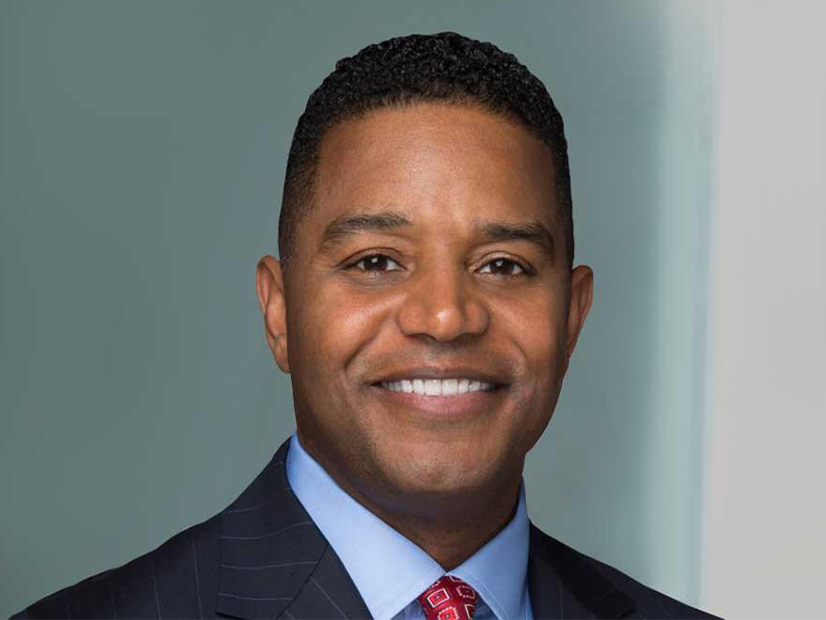With utilities in states with aggressive clean energy goals — including Illinois, Maryland and D.C. — Exelon CEO Calvin Butler spent part of Wednesday’s first-quarter earnings call talking about how the company’s recently filed multiyear rate cases will help meet those decarbonization targets.
“We are well underway in a number of jurisdictions with three new filings initiated since the fourth-quarter earnings call,” Butler said in his second earnings call as the company’s CEO. “Building a stronger, smarter, resilient and cleaner grid requires investments. We are engaging with our stakeholders to align on our shared goals and ensure this investment is compensated fairly.”
For example, Baltimore Gas and Electric’s (BGE) multiyear plan, filed in February, calls for $2.3 billion in investments for Maryland’s electric grid and natural gas systems and another $400 million for electric vehicle and building efficiency programs, CFO Jeanne Jones said.
“BGE’s infrastructure plan includes more than 300 projects and maintenance programs designed to continue meeting customers’ needs that lay the foundation for the state of Maryland to reach its goal of net-zero emissions by 2045,” Jones said.
The rate increases to pay for these investments would start with a 6.8% hike in 2024, ramping down to 4.5% in 2025 and 3.7% in 2026, according to the company summaries of its current rate base applications included in the earnings call presentation.
Butler also sees opportunities emerging for BGE with Maryland’s Promoting Offshore Wind Energy Resources (POWER) Act, recently signed into law by Gov. Wes Moore (D). The law calls for the deployment of 8.5 GW of offshore wind and a regional study on the associated transmission needs.
“We’ll prioritize leveraging existing infrastructure, permitting risks and grid challenges, use of open access of collective transmission system and avoiding any single-contingency items,” Butler said.
At the same time, the Maryland and Illinois multiyear plans will be facing new regulators. In Illinois, Gov. JB Pritzker (D) has named Doug Scott, energy systems vice president at the Great Plains Institute, to chair the Illinois Commerce Commission, beginning in June. Scott previously chaired the ICC from 2011 to 2015 and also served as head of the state’s Environmental Protection Agency.
In Maryland, Moore has nominated Fred Hoover, an attorney with the Office of the People’s Counsel, to head the Public Service Commission. Hoover also served as director of the Maryland Energy Administration under former Gov. Parris Glendening (D).
Butler described the leadership changes as “part of the process” of working with regulators. “Given this [energy] transformation will be measured in decades, it reinforces the importance of building a shared, forward-looking understanding across a variety of stakeholders, which is accomplished through transparency and collaboration,” he said.
Asked if he had been in communication with Scott, Butler said, “There has been communication, but the communication has been around moving the state’s goals forward.” The Climate and Equitable Jobs Act, which Pritzker signed in 2021, commits Illinois to moving toward net-zero by 2050, with 40% of its power coming from renewable energy by 2030 and 50% by 2040.
Exelon is still expecting that Commonwealth Edison’s multiyear rate plan will be approved by the end of the year, Butler said. If approved, customers rates could jump 7.3% in 2024. ComEd has asked to defer 35% of the increase to 2026, to soften the impact, but that deferment would mean a 6% increase in rates in 2026.
Elephant in the Room
Following its first full year of separation from Constellation Energy, Exelon reported first-quarter earnings of $669 million on revenue of $5.56 billion. GAAP earnings per share were 67 cents, while adjusted, non-GAAP earnings were 70 cents.
The company reported $597 million in earnings on revenues of $5.3 billion for the same period last year.
“These results keep us on track to deliver earnings within our guidance range of $2.30 to $2.42/share for 2023,” Butler said.
In addition, Exelon’s four utilities — Atlantic City Electric, BGE, ComEd and Pepco — “had [their] best on-record reliability performance” in the first three months of 2023, he said. All four scored in the top quartile in terms of outage frequency and duration.
While Butler and Jones kept the call upbeat, the first question from analysts was on Tuesday’s guilty verdict in the trial of former ComEd CEO Anne Pramaggiore for a multiyear conspiracy to pay former Illinois House Speaker Michael Madigan (D) for passage of legislation favorable to the utility.
Former ComEd lobbyist and Madigan associate Michael McClain, former ComEd Vice President John Hooker and former ComEd consultant Jay Doherty were also found guilty. (See related story, Jury Finds Former ComEd CEO, 3 Others Guilty in Bribery Trial.)
The four were charged with nine counts of conspiracy to bribe Madigan in exchange for his help in passing bills that set certain rate charges that could not be debated before the ICC, producing millions of dollars of profits for the company over several years.
ComEd pleaded guilty to bribery in a deferred prosecution agreement in 2020, paying a $200 million fine and cooperating with Justice Department prosecutors for three years. But Butler said, “We have done more than that. We have made substantial changes to our contracting, lobbying and compliance operations to ensure that the conduct that was at issue in the trial would not happen again. … We are committed to the highest standard of integrity and ethical behavior.”
Solar in South Jersey
Both Butler and CFO Jones kept the call focused on Exelon’s investments in improving and decarbonizing the grid and the value and benefits customers will get for their increased rates.
Jones talked up the multiyear rate case for Pepco in D.C., filed with the district’s Public Service Commission on April 13. The nation’s capital is targeting 2045 for citywide carbon-neutrality, and in support of that goal, “Pepco is requesting a $190.7 million revenue increase over the 2024 to 2026 period,” she said.
The money will be invested in “system equipment and infrastructure that will enable integration of more renewable energy such as solar,” Jones said. It “will also help customers access and adopt cleaner energy technology like electric vehicles and will allow Pepco to manage load to ensure the electric service customers depend on is available when they need it.” On a similar note, Jones talked about Atlantic City Electric’s smart meter program, which has been installing about 30,000 new meters per month since September 2020.
“Smart meters are foundational for smarter power grids,” she said. Benefits include being able to restore power faster and “better integration of new clean energy technologies, including solar.”
ACE has the highest level of solar penetration of all Exelon’s utilities, 25% of peak demand, she said.


